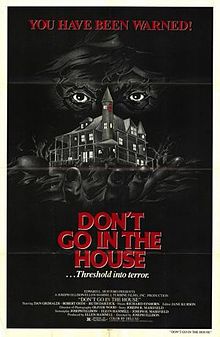- Don't Go in the House
-
Don't Go in the House 
Directed by Joseph Ellison Produced by Matthew Mallinson
Dennis Stephenson
Edward L. MontoroWritten by Ellen Hammill
Joseph R. MasefieldStarring Dan Grimaldi
Robert Osth
Charles Bonet
Bill RicciMusic by Richard Einhorn Cinematography Oliver Wood Editing by Jane Kurson Studio Turbine Films Distributed by Film Ventures International Release date(s) March 28, 1980 Running time 82 minutes Country United States Language English Don't Go in the House (also known as Pyromaniac in France) is a low budget 1980 slasher film emulating Psycho that gained notoriety as a video nasty and remains banned in some countries. It focuses on the main character's abuse-driven psychoticism and paranoia/schizophrenic hallucinations, mostly unnoticed to those around him.[1]
Contents
Plot
Donald "Donny" Kohler is deeply disturbed individual who was emotionally and physically scarred by burns inflicted on him by his mother. As a child, whenever he did something she saw as "wicked," she would hold his bare arms over a gas stove in an effort to "burn the evil out of him." Due to this he has developed a secret obsession with fire and human combustion. During his job at an incinerator, he observes a co-worker, Billy, catch on fire. Instead of going for help, he stares, mesmerized. When he returns home he finds his mother has died. While he is free from her possessiveness, the only life he has ever known is gone, and with it his chance for revenge against her. He sets out to avenge himself on every woman who bears a resemblance to his hateful parent with the aid of makeshift steel chains, a home-made flamethrower and a steel-paneled bedroom crematorium.
One of his first victims is local florist Kathy Jordan (Johanna Brushay). Befriending the harmless-looking man, Kathy escorts Donny back to his mother's house, where he knocks her unconscious, ties her up and burns her to death with his flamethrower.
Cast
- Dan Grimaldi as Donald "Donny" Kohler
- Robert Osth as Bobby Tuttle
- Bill Ricci as Vito
- Charles Bonet as Ben
- David Brody as Tony
- Nikki Collins as Farrah
- Johanna Brushay as Kathy Jordan
- Ralph D. Bowman as Father Gerritty
- Tom Brumberger as Alfred
- Louise Grimaldi as Barbara
- Gloria Szymkovicz as Sylvia
Controversy
Despite some respectable critical notices, Don't Go In the House attracted controversy almost immediately because of its graphic depiction of the death of Kohler's first victim, and the touchy central theme of childhood abuse. The film was cut by almost three minutes when it was released in Britain in the winter of 1980, but an uncut version was released on video by the Arcade label in 1982 - knowingly or not, they advertised the release as "a true 'nasty' from Arcade", and it quickly wound up on the DPP's list of banned titles. The pre-cut British cinema version was released on video by the Apex label in April 1987.
Critical reception
Ian Jane of DVD Talk said, "Don't Go In The House isn't for everyone – it's a bitter, ugly, and nasty little horror movie that doesn't pull any punches and is just as seedy today as it was when it was made. It's effective in that it gets under your skin despite its low budget origins and obvious flaws."[2]
David Johnson from DVD Verdict wrote, "Don't Go in the House is a well-acted, disturbing film, featuring one of the few horror scenes to really get to me."[3]
J.C. Maçek III of WorldsGreatestCritic.com said of the film, "It doesn't help that it's got the approximate originality of a Mad TV spoof of a Saturday Night Live satire of a Scary Movie II lampoon of The Others! Dead Mother in the house still dominating her socially immature, grown, serial killer son. Holy crap. Somebody should make a movie called DON'T... RIP OFF HITCHCOCK!"[4]
Release
Released on a low budget on DVD at a time when home DVD players were first coming to the market and people were building libraries from the few movies available, this title reached audiences that might otherwise have passed it up for more mainstream options. It became a cult-classic as a result, much like Lana Clarkson's Barbarian Queen film and David Carradine's Death Race 2000.
More recently, ScreamShow's Region 1 DVD presented a remastered widescreen print of the film with an audio commentary from star Dan Grimaldi, as well as a brief filmed interview with Grimaldi, theatrical trailers and TV spots and short 'unmatted' extracts from the full-screen VHS version.
See also
References
- ^ New York Times. "Don't Go in the House". New York Times. http://movies.nytimes.com/movie/14322/Don-t-Go-in-the-House/overview. Retrieved 2011-04-03.
- ^ Ian Jane. "Don't Go in the House". DVD Talk. http://www.dvdtalk.com/reviews/19651/dont-go-in-the-house. Retrieved 2011-04-03.
- ^ Davud Johnson. "Don't Go in the House". DVD Verdict. http://www.dvdverdict.com/reviews/dontgoinhouse.php. Retrieved 2011-04-03.
- ^ J.C. Maçek III. "Don't Go in the House". WorldsGreatestCritic.com. http://www.worldsgreatestcritic.com/dontgointhehouse.html. Retrieved 2011-04-03.
External links
- Don't Go in the House at the Internet Movie Database
- Don't Go in the House at AllRovi
Categories:- English-language films
- 1980s horror films
- American films
- Slasher films
- Serial killer films
- American horror films
- Crime thriller films
- American thriller films
- 1980 films
- Psychological horror films
Wikimedia Foundation. 2010.
